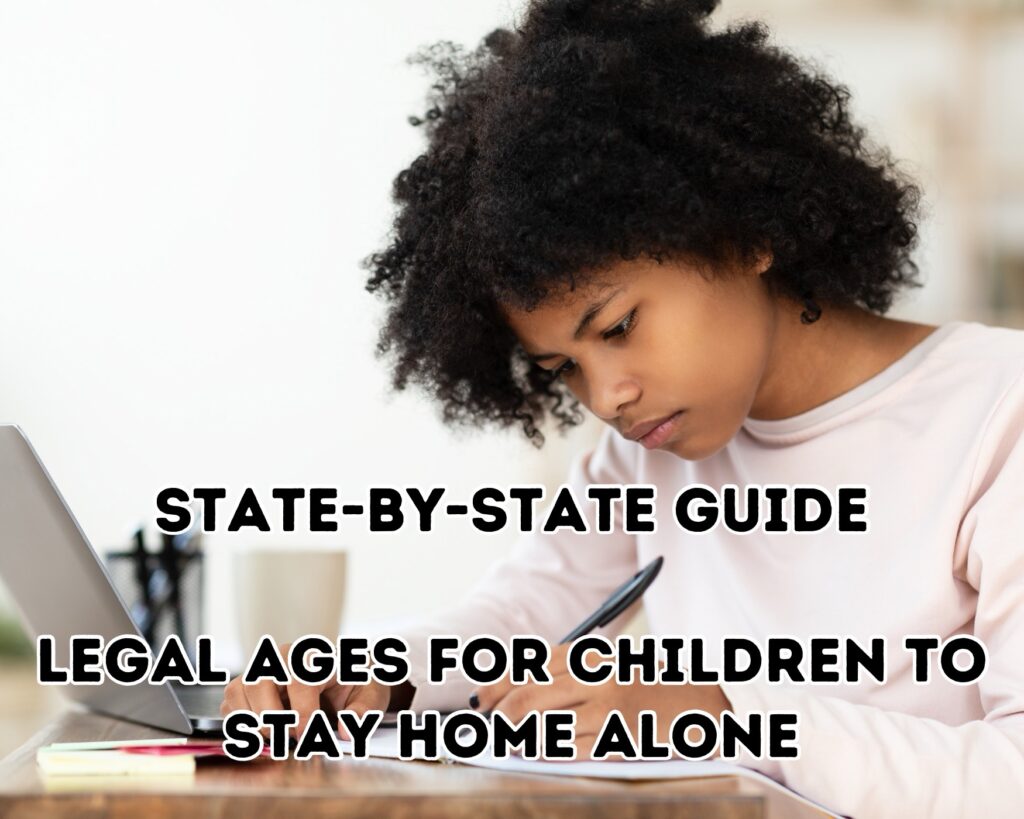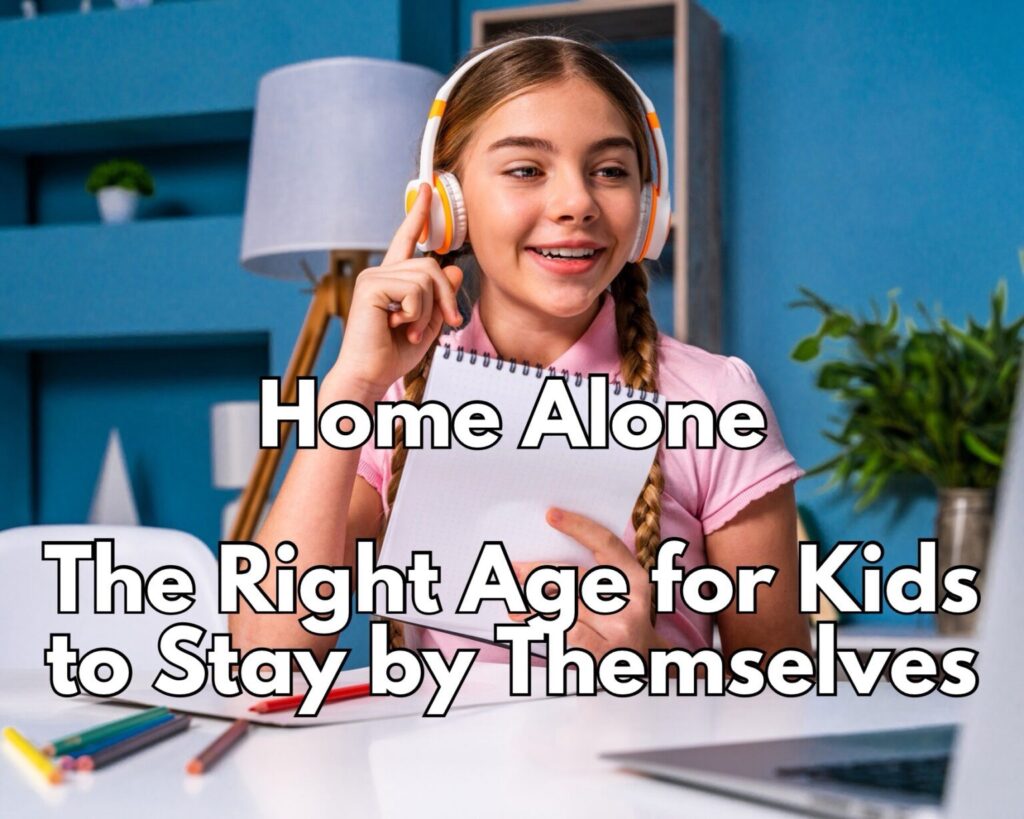As parents, one of the trickiest decisions we face is determining the right age to start leaving our children home alone. It’s a rite of passage that signals independence and trust, but it’s also fraught with legal and safety considerations. The United States does not have a one-size-fits-all answer to this question; instead, the legal age for children to stay home alone varies from state to state. This variance makes it essential for parents to be well-informed about their specific state’s laws and guidelines to ensure they’re making decisions that are both legally sound and in the best interest of their children.

Understanding these legal ages is more than just knowing a number; it’s about recognizing the maturity and readiness of your child to handle being alone, the safety of your home environment, and the specific legal framework within your jurisdiction. Some states have clear statutory age requirements, while others offer guidelines or leave the decision to parental discretion. This guide aims to provide a comprehensive overview of these laws and recommendations, equipping parents with the knowledge needed to navigate this important aspect of child rearing responsibly. Whether your state has strict laws or more flexible guidelines, knowing the legal landscape is the first step in ensuring the safety and well-being of your children when they begin to experience independence at home.
Understanding Legal Ages for Home Alone Supervision
When we talk about “latchkey kids,” we’re referring to children who return from school to an empty home or are left alone at home for certain periods. The term has evolved to encompass broader scenarios involving child self-supervision, sparking significant debate and concern over the appropriate age for this level of independence. This discussion isn’t just about social norms; it’s deeply entwined with legal implications that vary significantly across the United States.
The Difference Between Statutory Law, Guidelines, and Recommendations
Before diving into the specifics, it’s crucial to understand the types of regulations that govern children staying home alone:
- Statutory Law: These are laws formally enacted by the legislature, which specify the legal age a child can be left home alone. Violating these laws can result in legal consequences for the parents.
- Guidelines: Some states provide guidelines or recommendations rather than strict legal requirements. These are designed to offer parents advice on when it might be appropriate for a child to stay home alone based on maturity level and other factors.
- Recommendations from Child Welfare Organizations: Nationwide organizations, such as the Department of Health and Human Services or Child Welfare Agencies, sometimes offer recommendations. While not legally binding, they provide a framework for best practices.
For more in-depth insights and a thoughtful discussion on the right age for kids to stay by themselves, including expert opinions and parental tips, visit 🌟 Life With Kids Blog 🌟. This resource offers valuable perspectives on balancing legal requirements with a child’s readiness for more independence.
Federal Guidelines and Recommendations
At the federal level, there are no specific laws dictating the age at which children can be left home alone. Instead, the federal government provides general guidelines through the Department of Health and Human Services or Child Welfare Agencies. These recommendations serve as a baseline for states to develop their own laws or guidelines. It’s important for parents to familiarize themselves with these federal recommendations as a starting point and then delve into the specifics of their state’s stance on the matter.
State-by-State Analysis
In the following sections, we will break down the legal age requirements, guidelines, and recommendations for children staying home alone, state by state. This analysis will help parents understand not only the letter of the law in their jurisdiction but also the spirit of the guidance provided to ensure the safety and well-being of children experiencing home alone time.

State-by-State Analysis
Navigating the legalities of leaving children home alone requires an understanding of the specific laws and guidelines that apply in each state. This section provides a detailed look at how each state approaches the issue, offering clarity for parents on the legal age for children to stay home alone across the United States.
States with Statutory Age Requirements
A few states have enacted statutory laws that specify the minimum age a child must be to stay home alone. These laws are clear-cut, providing parents with a definitive legal age requirement. For instance:
- Illinois: Known for having one of the more specific laws, Illinois requires children to be at least 14 years old to be left unsupervised.
- Maryland: Recommends children be 8 years old before they are left alone, providing a guideline that has legal implications.
It’s important for parents to know these specific ages to ensure compliance with state law and to protect their children’s safety.
States with Guidelines but No Specific Age
Many states opt to provide guidelines rather than strict legal age requirements. These guidelines often consider a child’s maturity level, the duration of the time alone, and the overall safety of the environment, among other factors. States like California and New York fall into this category, offering recommendations to help parents make informed decisions without imposing a hard legal age limit.
States Without Clear Regulations
Some states do not have clear laws or guidelines regarding the age at which children can be left home alone. In these cases, the decision is left to the parents’ discretion. However, this discretion should be exercised with consideration of the child’s maturity, the safety of the home environment, and the ability of the child to respond to emergencies.
For a comprehensive look at the appropriate ages for kids to be left home alone, including insights into the balance between legal requirements and a child’s readiness, visit 🌟 Life With Kids Blog 🌟. This resource provides parents with valuable information and perspectives on ensuring their children’s safety and well-being when they start to experience more independence.
Considerations for Parents
When deciding if your child is ready to stay home alone, consider not only the legal aspects but also factors such as:
- Maturity Level: Assess your child’s ability to follow rules and make responsible decisions.
- Emergency Preparedness: Ensure your child knows what to do and who to contact in case of an emergency.
- Duration and Time of Day: Consider how long your child will be alone and at what time of day. Shorter durations during daylight hours are generally seen as less risky.
- Neighborhood Safety: The overall safety of your neighborhood should also play a role in your decision.
Legal Implications for Parents
Failing to adhere to state laws or guidelines regarding leaving children home alone can lead to legal consequences, including charges of neglect or endangerment. It’s crucial for parents to understand not only the laws in their state but also how their decisions might be viewed by law enforcement and child welfare authorities.
Resources for Parents
Parents seeking more detailed information on their state’s laws and guidelines can find resources through state child welfare agencies, legal aid organizations, or online legal databases. Engaging with these resources can provide clarity and confidence in making the best decisions for your child’s independence and safety.
State-by-State Legal Ages for Children to Stay Home Alone
- Alabama: No specific law.
- Alaska: No specific law.
- Arizona: No specific law.
- Arkansas: No specific law.
- California: No specific law, but guidelines suggest maturity is key.
- Colorado: No specific law, but guidelines suggest 12 years as a minimum.
- Connecticut: No specific law, but guidelines recommend 12 years.
- Delaware: No specific law.
- Florida: No specific law.
- Georgia: No specific law.
- Hawaii: No specific law.
- Idaho: No specific law.
- Illinois: Legal age is 14.
- Indiana: No specific law.
- Iowa: No specific law.
- Kansas: No specific law.
- Kentucky: No specific law.
- Louisiana: No specific law.
- Maine: No specific law.
- Maryland: Guidelines recommend 8 years.
- Massachusetts: No specific law.
- Michigan: No specific law, but guidelines suggest 12 years.
- Minnesota: No specific law.
- Mississippi: No specific law.
- Missouri: No specific law.
- Montana: No specific law.
- Nebraska: No specific law.
- Nevada: No specific law.
- New Hampshire: No specific law.
- New Jersey: No specific law.
- New Mexico: No specific law.
- New York: No specific law, but guidelines suggest maturity is key.
- North Carolina: No specific law, but guidelines suggest 8 years.
- North Dakota: No specific law.
- Ohio: No specific law.
- Oklahoma: No specific law.
- Oregon: No specific law.
- Pennsylvania: No specific law.
- Rhode Island: No specific law.
- South Carolina: No specific law.
- South Dakota: No specific law.
- Tennessee: No specific law.
- Texas: No specific law.
- Utah: No specific law.
- Vermont: No specific law.
- Virginia: No specific law, but guidelines suggest 8 years as a minimum.
- Washington: No specific law.
- West Virginia: No specific law.
- Wisconsin: No specific law.
- Wyoming: No specific law.
Understanding the legal age for children to stay home alone is a critical aspect of parenting in today’s world. By familiarizing yourself with your state’s laws and guidelines, considering your child’s readiness, and staying informed through resources like 🌟 Life With Kids Blog 🌟, you can navigate this important milestone with confidence and ensure your child’s safety and well-being.
As an Amazon Associate we earn from qualifying purchases through some links in our articles.




